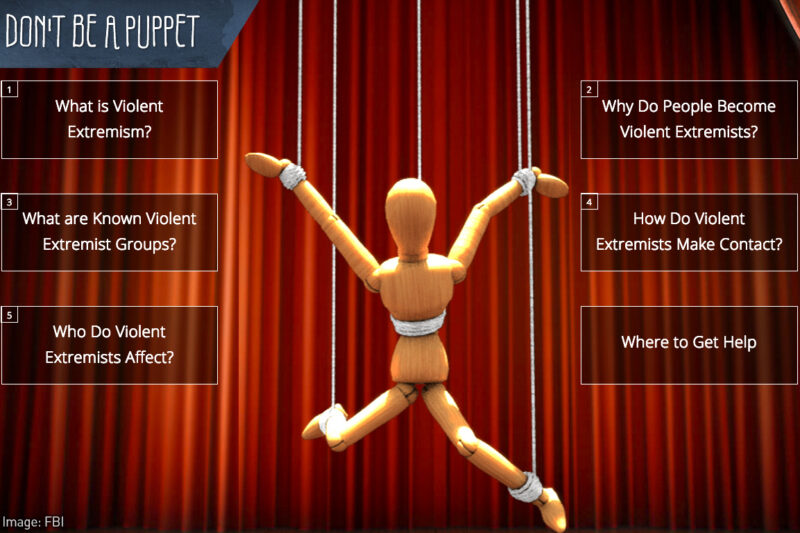What Could Go Wrong With Asking Teachers To Monitor Kids for ‘Extremist’ Beliefs?


Are these the tell-tale signs of kids at risk of committing violence: An 8-year-old who wore a t-shirt saying he wanted to be like a seventh-century Muslim leader? A 17-year-old who sought to draw attention to the water shortage in Gaza by handing out leaflets? A 4-year-old who drew a picture of his dad slicing a vegetable?
Teachers and school officials in the United Kingdom thought so, and they referred these children for investigation as potential terrorists. They were interrogated by U.K. law enforcement. They’re likely subject to ongoing monitoring, with details of their childhoods maintained in secret government files potentially indefinitely.
A report released last week by Rights Watch (UK) highlights these and other children’s experiences under a U.K. countering violent extremism (CVE) program known as Prevent. Prevent imposes a legal obligation on schools to implement policies assessing whether children have “extremist” views or are at risk of engaging in terrorism, and to “intervene as appropriate.” Intervention may include referring the child to a related program in which panels of police officers, teachers, and other government employees identify children they think are vulnerable to terrorist recruitment.
Why should any of this concern Americans? Because the FBI wants to do something a little bit too close for comfort in U.S. schools, and American schoolchildren may come under similar suspicion and scrutiny.
There are some things we just shouldn’t import — and on the top of that list should be a discriminatory government program that turns teachers into spies and stifles children’s ability to learn, ask questions, and debate ideas.
While there’s no similar government-imposed duty on American schools, U.S. CVE initiatives are based on the Prevent model. Due to this, a core component of the U.S. CVE plan tasks teachers, social workers, and school administrators with monitoring and reporting to law enforcement on children in their care. An FBI document released earlier this year tells teachers to spy on their students’ thoughts and suggests that administrators essentially turn schools into mini-FBI offices. Rights Watch’s report shows what might happen if American schools actually follow the FBI’s proposals.
Prevent, unsurprisingly, turns out to be controversial and divisive—a “toxic brand.” Earlier this year, the United Kingdom’s largest teachers union voted to reject the program, calling it ineffective and counterproductive and stating that it causes “suspicion in the classroom and confusion in the staffroom.”
We’ve written before about one fundamental concern with CVE programs: They are premised on disproven theories and junk science. Despite years of study, there is no reliable indicator to predict who will engage in violence. In the absence of reliable indicators, the Rights Watch report shows that U.K. programs rely on overbroad and ambiguous criteria describing common and entirely innocent conduct. These so-called indicators include changing one’s style of dress or appearance to match a certain group, expressing a need for identity or belonging, or “becoming quieter” — factors so general it would be difficult to find a child or teenager who hasn’t exhibited such behavior at some point.
Unsurprisingly, when teachers are required to report on “extremist” thoughts or conduct using unreliable and vague criteria, some of those teachers’ suspicions reflect society’s prejudice. Rights Watch found that although Prevent purports to apply to all children at risk of extremism, it disproportionately targeted Muslim children. According to Rights Watch:
"[T]argeting Muslim children, making them feel that they are not welcome to discuss political or religious matters at school, and creating a dynamic in which Muslim youth come to be fearful of the educational setting and distrustful of their teachers and their classmates, is counter-productive, discriminatory, and a violation of the fundamental rights that are at the heart of the very civil society the government seeks to protect."
CVE programs in the United States using similarly overbroad and ambiguous criteria will inevitably result in discriminatory and unfair targeting of American Muslim children, too.
Another concern about CVE programs is that the government uses them to task people to spy on each other. The Rights Watch report bears out this concern — and its consequences. In the U.K., students fear that reading “controversial” books or engaging in classroom discussion may cause teachers to report them as potential terrorists. Teachers in turn report that Muslim students are ceasing to engage in classroom debate and that teachers themselves are self-censoring the topics they discuss in classrooms. Rights Watch found resulting violations of students’ freedoms of speech and association and their rights to privacy and equal treatment in education.
Here in the United States, the first principle of the National Education Association’s Code of Ethics is a commitment to the student. Teachers may not deny a student’s access to different viewpoints, deliberately suppress or distort subject matter relevant to a student’s progress, or restrict benefits to any student on the basis of race, national origin, or political or religious beliefs. The Rights Watch report is a warning to American principals and teachers of how CVE programs can violate that first principle. It’s also a warning to the U.S. agencies charged with formulating or implementing CVE, including the Departments of Justice, Homeland Security, Health and Human Services, and Education.
There are some things we just shouldn’t import — and on the top of that list should be a discriminatory government program that turns teachers into spies and stifles children’s ability to learn, ask questions, and debate ideas.

